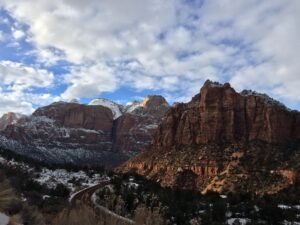 When Michele Straube founded the Wallace Stegner Center’s EDR program in 2012, she somewhat jokingly suggested the EDR acronym stands for “extra dialogue required.”
When Michele Straube founded the Wallace Stegner Center’s EDR program in 2012, she somewhat jokingly suggested the EDR acronym stands for “extra dialogue required.”
Technically the EDR in our name stands for Environmental Dispute Resolution. However, as the program has grown and morphed to be responsive to the changing times, the idea that EDR stands for extra dialogue required has become increasingly apt.
Since the founding of the EDR program, our mission has been to foster a culture of collaboration around environment, natural resources, and broader public policy issues. We define “environment” as being inclusive of both the biophysical and human environment, and particularly focus our efforts at the intersection of the two, recognizing that any effort to protect our natural resources and landscapes needs to account for human needs as well.
In line with our mission, we have always focused on working “upstream” in conflict, supporting interested parties in assessing whether collaboration is ripe and helping them work through conflict to co-create mutual gains outcomes before they have a dispute. While this focus continues to guide our work, our thinking about how to pursue our mission and where to put our energy has shifted in recent years as a reflection of the needs and challenges we are seeing in the world.
Get notified when new articles are posted to the EDR blog. Sign up for our email list »
Early in the EDR program’s history, much of our focus was on catalyzing and supporting what we call “Capital C” collaborative processes—for example, watershed restoration collaboratives or consensus building efforts aimed at developing management plans for grazing allotments. The EDR program team members still see value in those “Capital C” collaborative efforts and think they have promise for effectively addressing complex public issues when the conditions are ripe for collaboration. However, EDR program Associate Director Nedra Chandler and I have observed over the years that the efficacy of Capital C collaboratives is often limited by the fact that participants aren’t particularly skillful in dealing with conflict. Simultaneously, we have grown increasingly concerned about the amount of unproductive (and often quite destructive) conflict playing out in our country over the last few years. Nedra and I believe that a much more “conflict competent” society is necessary in order to successfully address pressing social and environmental challenges. As part of this, we also believe that our society must co-create structures and systems, including governance systems, that make it easier for people and organizations to work through conflict productively.
In light of these observations, the EDR program team has shifted our focus to collaboration as a “way of being” rather than as a process. Collaboration as a way of being, we believe, is all about making conflict productive through extra (or, more accurately, extra-effective) dialogue. So that is where we are putting our energy: in building individuals’, teams,’ and organizations’ collaborative capacity through helping them develop the awareness and skills needed to productively work through conflict and co-create mutual gains solutions.
In order to build this capacity, we are doubling down on our efforts to train and coach people in the skills of productive conflict, such as through our:
- Annual collaboration certificate course for professionals in environmental, natural resource, and public policy fields, which is now offered in a fully online format to make the course accessible to participants from a broader geographical area;
- Array of professional trainings, including tailored conflict resolution and collaboration courses for teams and organizations;
- Expanded coaching offerings that help high-level professionals and teams from government and other major organizations hone their skills for working together and productively navigating conflict; and
- New Collaborative Leadership Network, which provides continuing education and coaching opportunities for individuals who have completed intensive teaching, training, or coaching activities with the EDR program.
The EDR Program is also focusing energy on providing thought leadership and getting tools, resources, and information related to collaboration and skillful conflict out into the world. We are revamping our EDR blog to share carefully curated articles on key concepts, skills, tools, and resources we think are core for collaboration and skillful conflict navigation. We are continuing to develop our free online tools and resources page. We are also launching a new monthly Tidbits email, which will feature our recent EDR blogs and other EDR program tools, resources, and offerings (sign up for the email by selecting Environmental Dispute Resolution program news).
As part of our thought leadership efforts, I am currently working on a popular press book that emphasizes “conflict just is” and that, if we are skillful in how we deal with conflict, it can be quite productive. The book will provide an overview of the core “inner” and “outer” skills that I believe are key to helping people make conflict productive in all aspects of their lives.
While we are focusing our energy more on capacity-building efforts than on Capital C collaborative efforts, we continue to provide collaboration assistance, such as in the form of situation assessments and collaborative process design, in select situations that have high potential to advance our mission.
As we undertake this endeavor of fostering a culture of collaboration through helping people, groups, and society be more skillful in dealing with conflict, we welcome partners, ideas, and resources to help expand our work. If you have any ideas and/or want to support our efforts to help promote a culture of collaboration and making conflict productive, let us know!
Danya Rumore, Ph.D., is the director of the Environmental Dispute Resolution program in the Wallace Stegner Center at the University of Utah. She is a research professor in the S.J. Quinney College of Law and a clinical associate professor in the city and metropolitan planning department at the University of Utah. She teaches about, practices, and conducts research on conflict, negotiation, dispute resolution, leadership, and collaborative problem solving. She is also the founder and a co-director of the Gateway and Natural Amenity Region (GNAR) Initiative.
About the EDR blog: Hosted by the Wallace Stegner Center’s Environmental Dispute Resolution (EDR) program, the EDR blog shares ideas, tools, and resources to cultivate a culture of collaboration and help readers be more skillful in working through conflict. Read additional blog posts at edrblog.org.

